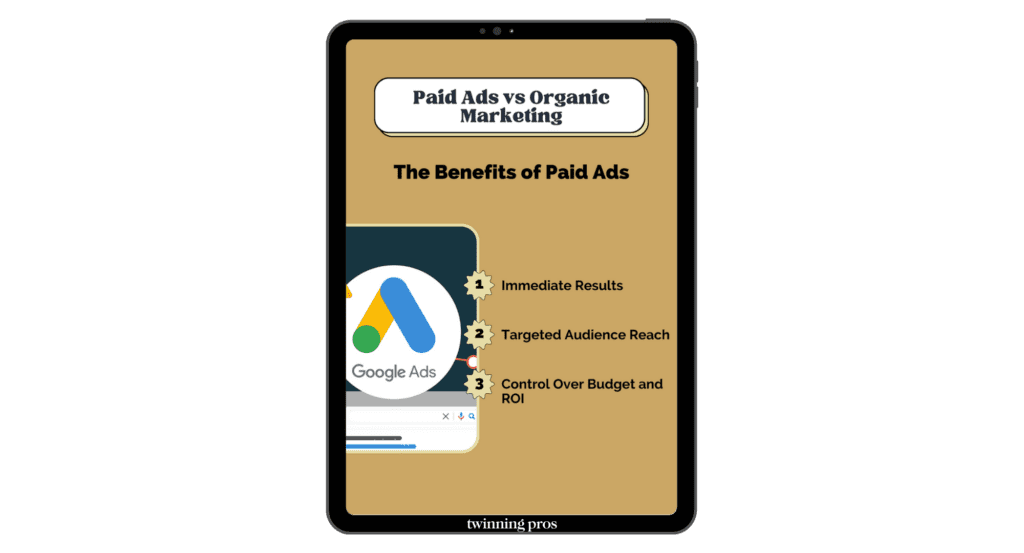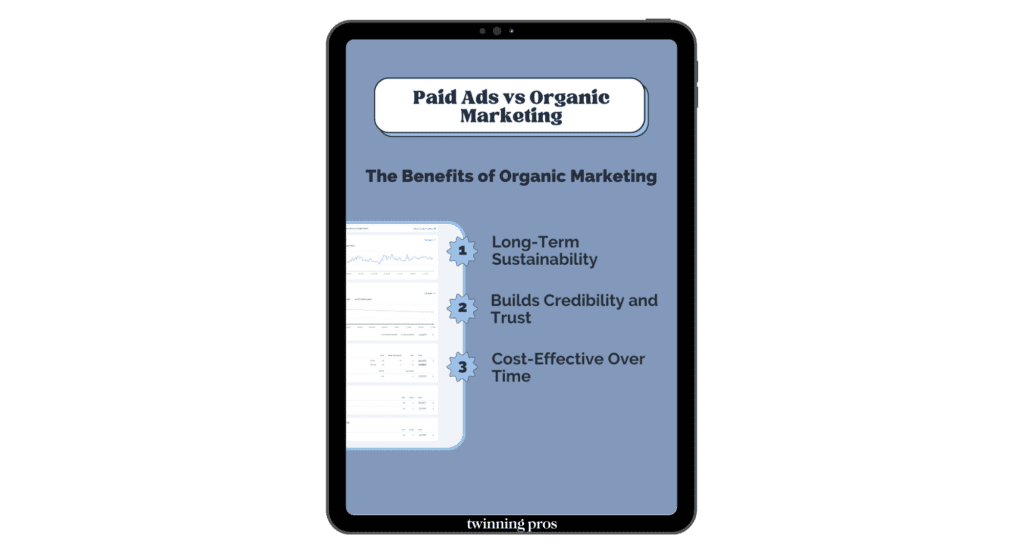Should you invest in paid ads or focus on organic marketing? For many small business owners, this is a common dilemma. Both strategies can help grow your business, but knowing which one to prioritize—and when—can make all the difference in reaching your goals.
In this post, we’ll explore the key differences between paid ads and organic marketing, the benefits of each, and when it makes sense to use one or both for your business.
Table of Contents
What Are Paid Ads and Organic Marketing?
Before diving into the pros and cons, it’s essential to understand the distinction between paid ads and organic marketing.
- Paid Ads: Paid ads refer to advertising campaigns where you pay for visibility, such as Google Ads, Facebook Ads, or Instagram sponsored posts. These ads give you instant exposure but require a financial investment.
- Organic Marketing: Organic marketing involves growing your visibility naturally without paying for clicks or placements. This includes strategies like SEO (Search Engine Optimization), social media posts, and content marketing.
Knowing how these two approaches differ is critical to choosing the right one for your business based on your goals, budget, and timeline.
For more guidance on getting started with paid ads, check out Getting Started with Google Ads: A Beginner’s Guide for Small Businesses.
The Benefits of Paid Ads
Immediate Results
With paid ads, you can generate immediate traffic and conversions. As soon as your campaign goes live, you can reach your audience and start driving clicks. This makes paid ads an excellent choice if you need quick results for a product launch, seasonal sale, or time-sensitive promotion.
Example: If you’re launching a new product, Google Ads can help you rank at the top of search results for relevant keywords right away, giving you instant visibility.
Targeted Audience Reach
Paid advertising platforms offer advanced audience targeting options based on demographics, interests, behaviors, and more. You can refine your audience and ensure that your ad is seen by users who are most likely to convert, increasing your chances of success.
Example: With Facebook Ads, you can target users based on their purchasing behaviors, meaning you’re reaching people who are more likely to buy your product or service.
To learn how to optimize your audience targeting read How to Use Targeting to Maximize Your Paid Advertising Budget
Control Over Budget and ROI
One of the significant advantages of paid ads is the ability to control your budget. Platforms like Google Ads and Facebook Ads let you set daily or monthly spending limits, ensuring you never exceed your budget. Plus, you can track your return on investment (ROI) through detailed analytics, giving you insights into what’s working.
Example: With Google Ads, you can adjust your budget and bids in real-time, pausing underperforming ads and increasing the spend on high-performing ones.

The Benefits of Organic Marketing
Long-Term Sustainability
While organic marketing takes time to build, the payoff is worth it. Once your content ranks well in search engines or your social media gains traction, it can continue driving traffic without ongoing costs. Unlike paid ads, where results stop as soon as you stop spending, organic marketing delivers long-lasting results.
Example: An SEO-optimized blog post can attract visitors for months—or even years—after it’s published, giving you consistent traffic over time.
Builds Credibility and Trust
Organic marketing helps you build trust and credibility with your audience. By creating valuable, non-promotional content that addresses your audience’s pain points, you position yourself as a trusted authority in your industry.
Example: Regularly posting helpful tips on social media or answering common customer questions in a blog post can establish your brand as the go-to resource in your niche.
Cost-Effective Over Time
Although organic marketing requires an initial investment of time and resources, it becomes highly cost-effective once your strategy is in place. You won’t need to continually pay for visibility like you would with paid ads.
Example: Once you’ve built a strong SEO foundation, you’ll receive consistent traffic without paying for every click or view.
To understand how to grow your audience organically, read SEO and SEM: Boost Your Online Marketing Efforts.

When to Choose Paid Ads
You Need Immediate Traffic or Leads
If you need to generate traffic or leads quickly, paid ads are your best option. Whether you’re running a time-sensitive promotion or need fast results, paid ads give you immediate visibility.
Example: Running a limited-time holiday sale? Paid ads can help you attract customers right when they’re ready to buy.
You’re Launching a New Product or Service
When you’re launching a new product or service, you want to create awareness quickly. Paid ads allow you to promote your new offering to a large audience instantly, driving traffic and sales during your launch period.
Example: Use Facebook Ads to promote a new online course or product to a targeted audience and generate interest right away.
You Want to Test Messaging or Offers
Paid ads are a great way to test different messages, offers, or calls to action quickly. You can run A/B tests to see which version performs best, then apply the winning formula to your overall marketing strategy.
Example: Use Google Ads to test two different headlines or offers, and see which one gets the most clicks and conversions.
To learn how to improve conversion goals for better testing, read How to Set Up Conversion Goals in Google Analytics to Track Success: Measure What Matters.
When to Focus on Organic Marketing
You’re Looking for Sustainable Growth
If you’re in it for the long haul, organic marketing is key to building a sustainable business. While it takes time to see results, organic strategies like SEO and content marketing provide long-term growth without ongoing costs.
Example: Building an SEO strategy for your website ensures you’re attracting consistent traffic month after month, even without paid promotion.
You Want to Build Brand Credibility
Organic marketing helps you build trust and credibility over time. By regularly sharing valuable content and engaging with your audience, you can position your brand as an industry leader.
Example: Publishing in-depth blog posts or sharing expert advice on social media can help you grow a loyal following that turns to your brand for guidance.
You’re Operating on a Tight Budget
If your marketing budget is limited, organic marketing allows you to build momentum without the need for constant ad spend. While it requires time and effort, it’s a cost-effective way to grow your business.
Example: Focus on creating high-quality content, optimizing for SEO, and growing your social media presence organically to build your brand without paying for every click.
To understand more about leveraging organic growth strategies, check out How to Conduct Keyword Research for Your Small Business.
Combining Paid Ads and Organic Marketing for Maximum Impact
The Benefits of an Integrated Approach
Paid ads and organic marketing aren’t mutually exclusive. In fact, they work best when used together. Paid ads give you the immediate traffic and results you need, while organic marketing builds long-term sustainability.
Example: Use paid ads to drive traffic and conversions now, while investing in an SEO strategy that ensures you continue attracting visitors in the future.
How to Balance Your Budget and Time
The key to success is finding the right balance between paid and organic strategies. Allocate a portion of your budget to paid ads for quick wins, while dedicating time to organic growth for long-term success.
Example: Spend a portion of your budget on Google Ads to generate leads now, while building out your blog and social media presence for sustained growth.
If you’re working with a tight budget, you may also want to explore how email marketing can provide lasting results, as explained in Why Email Marketing Still Works: How to Get Results in 2025.
Conclusion: Which Strategy is Best for Your Business?
Both paid ads and organic marketing offer unique benefits for businesses. Paid ads deliver quick, targeted results, while organic marketing builds long-term trust and sustainability. The right choice depends on your goals, timeline, and budget.
Ready to take your marketing to the next level? Get in touch with Twinning Pros and discover how our expert team can help you combine paid ads and organic marketing for maximum impact.
If you’re ready to dive into paid ads, start with Getting Started with Google Ads: A Beginner’s Guide for Small Businesses or Facebook Ads 101: How to Create Ads That Convert.
SEO for Beginners
Learn from the SEO Strategist who has 75+ first page Google rankings under her belt.
We’re marketing nerds and business strategists that have generated millions of dollars in client revenue. We're sharing the systems and strategies to help your growing business with marketing that actually converts.
We're Tiffany + Tabatha

Comments